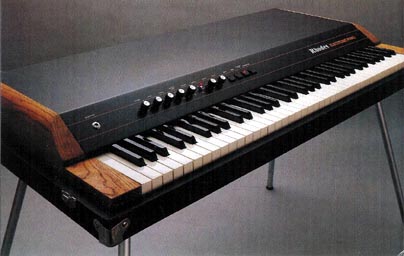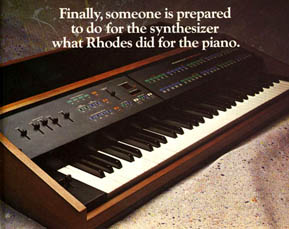ARP Synthesizers
For information about the Chroma, visit Chris Ryan's massive online resource at RhodesChroma.com. You'll find everything you ever wanted to know and more!
A handful of synthesizers were manufactured in the 1980's under the Rhodes name, even though they were not of Harold's design and typically had nothing to do with the Rhodes piano itself. The first wave surfaced when CBS acquired ARP, releasing the Rhodes Chroma in 1982. The Chroma had been under development at ARP since 1979, an analog/digital hybrid synth with a
When the seas came crashing down on ARP Instruments in 1981, two-year-old plans for a programmable polyphonic synth were seemingly dashed. The team that tried to surf through internal company resistance to produce the instrument were scattered by the waves.
Philip Dodds was left at the helm of a nearly submerged ARP. While pumping out the bilge, he managed to sell the Chroma design to CBS - and get himself hired as the director of its production. "We were ready to bring it out when everything at ARP came uncorked," he recalls. "We lost a full six to eight months from the development cycle. I also stopped the design at ARP a couple of times because it was heading down the wrong paths and because there were new technologies available that could put us significantly forward. Plus it just wasn't ready for prime time. Having already suffered through releasing products that weren't ready, I wasn't about to allow that to happen again."
The Chroma represents what could be considered the second generation of analog/digital hybrid synths. It came along at the peak of the SequentialProphet-5's popularity, offering then-radical functions such as multitimbral operation, voice layering, and keyboard splitting, not to mention velocity response. Voice structuring isn't limited to the familiar configuration of twin VCOs, a filter, two ADSRs, and a VCA; the Chroma's internal computer can route signals through two lowpass filters, in parallel or series, and position the VCA before or after the filters.
Dodds is particularly proud of one reaction at the Chroma's unveiling at the summer 1982 NAMM show in Atlanta: "Bob Moog came up, sat down, and played it for a few minutes. Then he broke out in this grin. He walked over to me and said, 'You did it! That's the best-feeling keyboard I've ever felt. You got the right velocity sensitivity.' A lot of people were critical, saying velocity response wasn't something people wanted. But Bob proved prophetic. He knew that this was the direction keyboards had to go."

Following in the footsteps of the Chroma, the ARP Electronic Piano was ultimately marketed as the Rhodes Electronic Piano (Model 3363), previously known to CBS insiders as the "4 Voice". When Harold Rhodes became aware of the advertising campaign surrounding this synth, he was furious. The presentation of these ads only created confusion about the future of the Rhodes product line. The Electronic Piano sounded nothing like a real Rhodes, and to put Harold's name on it was an insult. His reaction was to write an irate letter to CBS director of marketing John Shykun (01/17/83):
If this ad had been produced by ARP, I feel certain CBS would be initiating a lawsuit. There's nothing wrong with the exposure of the 4 Voice, in whatever glowing terms would best describe its virtues, but to tie it to the skirt strings of the traditional Rhodes, and, while doing so, to publish deliberate untruths about its ability to create "distinctive Rhodes piano sound" is counterproductive and damaging to both products.
Furthermore, the ad implies that this is the new Rhodes and therefore supercedes the basic product. This certainly drives a massive spike in the coffin of "our" Rhodes. The public already is concluding that it is the new Rhodes. R&D personnel have already received several distress calls for clarification.
The full impact of the damaging consequences of this ad may not fully be known for several months, but when the musician who buys this product and then finds out that it is not, as it claims, a worthy creator of "distinctive Rhodes sound" his hatred is going to be directed at the name "Rhodes" because he has been misled, not by ARP, but by Rhodes. After this doublecross how can he be induced ever to look seriously at any of the products we propose to introduce? What shall we call them; "The Old Rhodes", or "The Real Rhodes", or "The Authentic Rhodes"?

